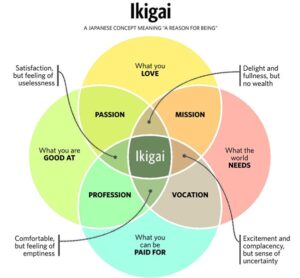
Ikigai – How can this Japanese philosophy help you have a more meaningful career and life?
Do you have a clear life purpose? Have you had or are you having a meaningful career? Have you had roles that are hugely satisfying, rewarding and fulfilling?
About 5 years ago I came across a Japanese word and concept called Ikigai. Although I had been providing career development and career transition advice to people for years, I had never come across such a simple yet powerful framework. Ikigai is our raison d’etre – our reason for being. It is your life purpose. It’s what brings joy and inspires you to get out of bed each day. It is the meaning in our lives, and it drives us to share the best of ourselves with the world. Some people believe Ikigai is the reason many Japanese people live long lives (note: Japan is ranked second in the world for life expectancy). Western culture has adopted this philosophy as a way of discovering a meaningful career.
Why is Ikigai important?
Unfortunately, during the global pandemic, the world has seen a huge increase in mental health issues, particularly anxiety and depression. Our aim is to find ways to lead a flourishing life but sadly s very low percentage of adults fall into this category. Ikigai is a philosophy and tool that can help move individuals along this mental health continuum towards flourishing.
How can we create more purpose and meaning in our lives and our careers?
 To establish a meaningful career, the concept of Ikigai suggests you need to find the balance between what you love, what you are good at, what you can be paid for, and what the world needs. The first element in the model is all about ‘what you love’. We experience this when we are in the flow state, fully present, engaged and aware of the present moment. Most people know what they love doing; however, to increase your self-awareness and insight into this aspect of yourself, a simple and useful exercise is to write a list of all the things you love about your current and any past jobs you have done and then write a list of all the elements of any job that you have done that you have not enjoyed at all. Sometimes you can gain insights into what you love doing by looking more closely at what you don’t like. Furthermore, you could ask yourself some key questions to understand your passions such as: are you absorbed in your work? Are you more excited about going to work than leaving work? Do you have an emotional connection to your work? Notwithstanding this, in a word of caution, not all aspects of a job can satisfy our need to always ‘love what we are doing’. So, sometimes we need to find more fulfilment and meaning in our lives outside of work.
To establish a meaningful career, the concept of Ikigai suggests you need to find the balance between what you love, what you are good at, what you can be paid for, and what the world needs. The first element in the model is all about ‘what you love’. We experience this when we are in the flow state, fully present, engaged and aware of the present moment. Most people know what they love doing; however, to increase your self-awareness and insight into this aspect of yourself, a simple and useful exercise is to write a list of all the things you love about your current and any past jobs you have done and then write a list of all the elements of any job that you have done that you have not enjoyed at all. Sometimes you can gain insights into what you love doing by looking more closely at what you don’t like. Furthermore, you could ask yourself some key questions to understand your passions such as: are you absorbed in your work? Are you more excited about going to work than leaving work? Do you have an emotional connection to your work? Notwithstanding this, in a word of caution, not all aspects of a job can satisfy our need to always ‘love what we are doing’. So, sometimes we need to find more fulfilment and meaning in our lives outside of work.
Another aspect of Ikigai is about ‘what are you good at?’ These are your skills and capabilities. They may be natural talents and/or competencies that you have developed over time through effort and exertion. Typically, we become skilled at things that we are passionate about however, sometimes we have learned to become skilled in a particular area without it being something we love doing. For example, I have a friend who went to university and became an accountant, after working in this field for only 2 years, he realised he didn’t like it and moved across to Human Resources where he has been for over 30 years. So, he became good at numbers but really loves people. To build your own self-awareness of your unique skills, you could ask: Do people ask for advice on topics related to your work? Are there some parts of your job that come easily to you? Are you or do you want to be an expert at what you do? Furthermore, sometimes the skills and capabilities that have made you successful in the past are not necessarily the ones that will serve you well in the future depending on the next role you are trying to obtain. Do you need to upskill/reskill? Are there skills you need to stop using to acquire new ones e.g. stop doing the doing and start delegating and managing more instead?
The third concept within this philosophy is ‘what you can be paid for?’ This part of the framework is potentially a little bit controversial because some people may argue that you should simply follow your passions and the rest will take care of itself. However, sadly there are many unhappy people in the world who have focussed solely on their passions and neglected this more practical element of life. It puts food on the table and a roof over a family’s head. The aim is not to earn a fortune but rather to be paid well enough to live a comfortable life. The research and evidence has been incredibly strong and unequivocal in demonstrating that we need enough money to live a fulfilling life, however, once we have ‘enough’ often our own desire for more than enough leads to a less happy and satisfying life. Questions to ask yourself in this category include: Are there other people getting paid for the same work you’re doing? Do you or will you be able to make a good living out of your work?
The final concept is about ‘what the world needs’. This is perhaps the most complex of the elements to fully comprehend. Sometimes it is hard to tell what positive impacts our work has on the world. What will create a visible and positive impact on the world around us? A few key questions you can ask yourself to reflect on this include: Is your work considered in high demand? Will your work still be valuable in 10 years? Are you solving a social, economic or environmental problem?
Whilst this framework is relatively simple as a concept, there can be challenges in its implementation throughout your life. If you have something that you love and that you are good at, but you are not getting paid well, you are unlikely to feel totally fulfilled and so you will need to spend time marketing yourself to get noticed and be paid well in recognition of your passion and skills. The most typical example of this would be an aspiring artist or singer. On the other hand, if you have a clear passion and you can see that the world needs this, you have a clear ‘mission’, but if you don’t have the skill to persuade people to join your mission, you will not be satisfied. Whereas if you have something that pays you well and something you are good at, you have a ‘profession’. This is what most people have. Whilst this pays the bills and puts food on the table, you are missing out on a true sense of fulfilment because you don’t love your work or see how it really makes a difference to others. This means you need to search for things that give your life meaning and purpose. Finally, if you get paid well and you know it can help the world, then you have a ‘vocation’. An example of this category is a University Professor who is paid well and helps the world but teaches that same subject year after year and doesn’t develop or improve. This will lead to a lack of happiness and personal wellbeing.
If you want to move towards a flourishing and thriving life, full of engagement and fulfilment, the best place to start is to adopt the Ikigai philosophy and gradually work your way through each element to fully understand what this means for you and then create and implement a plan to achieve it. This is not simple and straightforward to do alone, so I suggest seeking out a buddy, mentor or coach to guide you along this journey towards a more meaningful career and life.
Contact your nearest Steople office to discuss how we can help you implement the Ikigai philosophy today.

